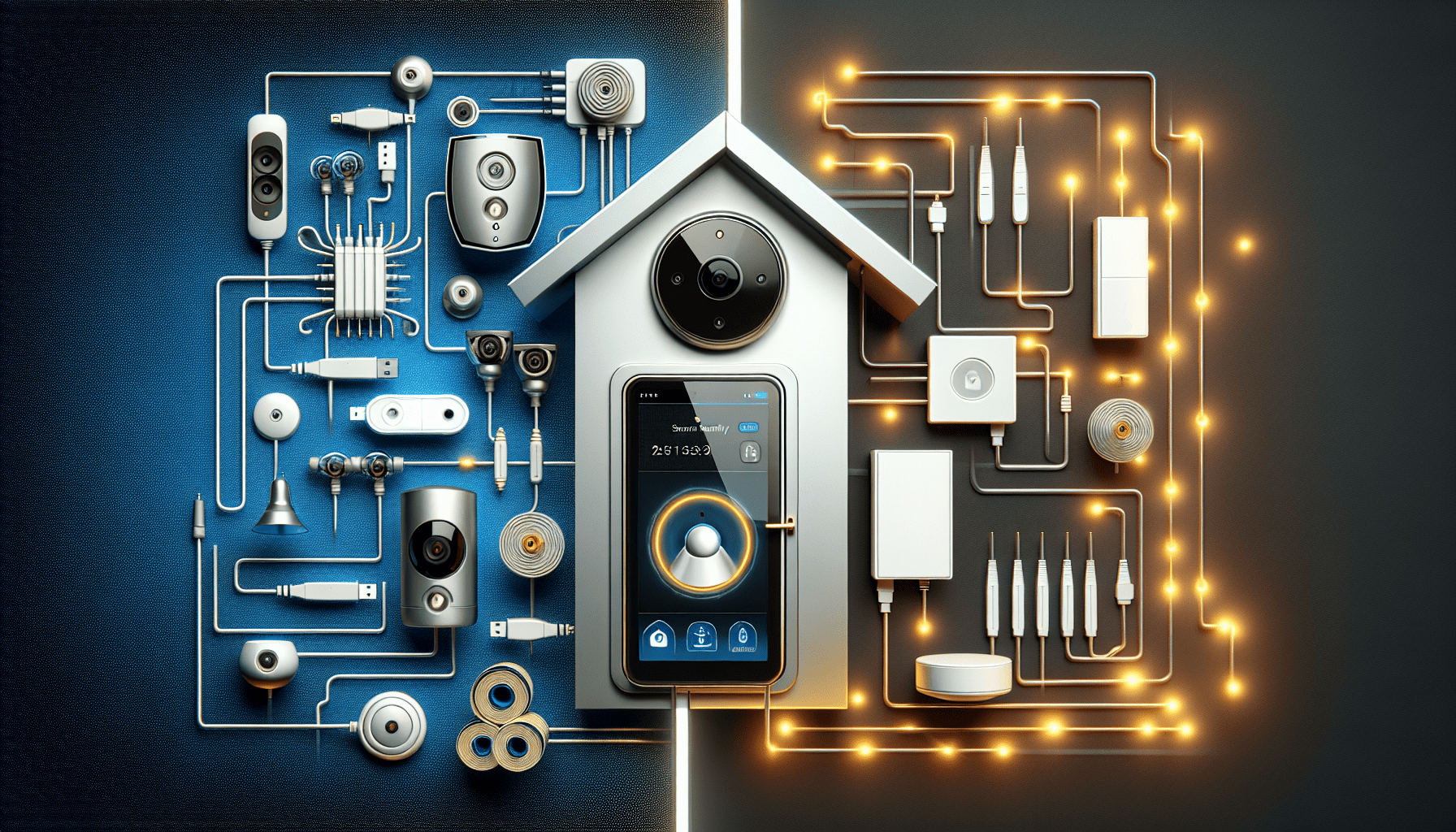Imagine a world where technology not only keeps us safe, but also helps protect our planet. A smart home security system does just that, combining advanced security features with eco-friendly benefits. By utilizing energy-efficient technologies, reducing waste, and promoting sustainability, these systems not only provide peace of mind but also contribute to a greener future. Let’s explore the various ways in which a smart home security system can have a positive impact on the environment.
Reduced Energy Consumption
Efficient Lighting Control
Using a smart home security system can significantly reduce energy consumption by providing efficient lighting control. With the ability to control and automate the lights in your home, you can ensure that they are only turned on when necessary and are not left on when no one is present. This eliminates the wasteful use of electricity and reduces your overall energy consumption.
Automated Heating and Cooling
Another environmental benefit of utilizing a smart home security system is the ability to automate and regulate your heating and cooling systems. By integrating your HVAC system with the smart home security system, you can set schedules and monitor the temperature in your home even when you are away. This enables you to optimize energy usage by adjusting the temperature based on occupancy and outside weather conditions, ensuring that you are not wasting energy on heating or cooling an empty home.
Optimized Appliance Usage
Smart home security systems also offer the opportunity to optimize appliance usage, further reducing energy consumption. By integrating smart plugs and switches with your system, you can remotely control and monitor the energy usage of your appliances. This allows you to turn off appliances that are not in use or set them to operate in energy-saving modes, thus reducing your overall energy consumption and contributing to a more sustainable lifestyle.
Minimized Carbon Footprint
Energy Conservation
By reducing energy consumption, a smart home security system helps minimize your carbon footprint. The less energy you consume, the fewer greenhouse gas emissions are produced in generating that energy. Conserving energy not only saves you money but also contributes to the global effort to combat climate change by reducing the demand for energy production.
Lower Greenhouse Gas Emissions
With efficient lighting control, automated heating and cooling, and optimized appliance usage, a smart home security system aids in lowering greenhouse gas emissions. By reducing the wasteful use of electricity and optimizing energy usage, the system minimizes the need for fossil fuel-based power generation, which is a major source of greenhouse gas emissions. Through the reduction of these emissions, the system helps to protect the environment and mitigate the impact of climate change.
Reduced Dependence on Fossil Fuels
Using a smart home security system also contributes to the reduction of dependence on fossil fuels. By minimizing energy consumption and optimizing resource management, the system helps shift towards a cleaner and more sustainable energy mix. By actively promoting energy efficiency and renewable energy integration, it encourages the adoption of alternative energy sources, further reducing reliance on fossil fuels and promoting a greener future.
Efficient Resource Management
Water Conservation through Smart Irrigation
A smart home security system can greatly contribute to water conservation through smart irrigation. By integrating sensors and weather data, the system can detect the moisture level in the soil and weather conditions, ensuring that your lawn and garden are watered only when necessary. This prevents overwatering and wasteful use of water, preserving this precious resource and promoting sustainable water management.
Optimized Use of Natural Resources
In addition to water conservation, a smart home security system enables optimized use of other natural resources. By monitoring and managing the usage of resources such as electricity, gas, and water, the system can identify areas of inefficiency and provide insights for improvement. This allows you to make more informed decisions about resource usage, thereby minimizing waste and maximizing the utilization of natural resources.
Reduced Waste Generation
Efficient resource management also plays a role in reducing waste generation. By actively monitoring and managing the usage of resources, a smart home security system helps identify and prevent situations that could lead to wastefulness and unnecessary waste generation. Whether it’s through automated energy-saving modes for appliances or reminders for recycling and waste reduction, the system promotes responsible resource consumption and waste management.
Enhanced Air Quality
Smart Ventilation Systems
A smart home security system can enhance air quality by integrating with smart ventilation systems. These systems can automatically monitor and adjust ventilation based on occupancy, indoor air quality, and external air conditions. By ensuring proper ventilation and airflow, the system helps remove pollutants and allergens from your home, promoting healthier indoor air quality and reducing the risk of respiratory problems.
Indoor Air Quality Monitoring
With the ability to monitor indoor air quality, a smart home security system provides valuable insights into potential air pollutants and allows you to take preventive measures. By measuring and analyzing air quality parameters such as temperature, humidity, and particulate matter levels, the system can alert you to potential concerns and suggest actions to improve air quality. This ensures that you and your loved ones are breathing clean and healthy air, thus improving overall well-being.
Reduced Exposure to Pollutants
By actively monitoring and managing indoor air quality, a smart home security system helps reduce exposure to pollutants. Whether it’s volatile organic compounds (VOCs), carbon monoxide, or other harmful substances, the system can detect their presence and alert you to take appropriate action. By minimizing exposure to these pollutants, the system enhances your health and safety, creating a more comfortable and sustainable living environment.
Prevention of Environmental Hazards
Early Smoke and Fire Detection
One of the crucial environmental benefits of a smart home security system is its ability to prevent environmental hazards such as fires. By integrating with smoke detectors and fire alarms, the system can provide early detection and immediate alerts in the event of a fire. This early detection can significantly reduce the risk of environmental damage, protect your home, and help prevent the spread of fires, thus safeguarding both you and the environment.
Gas Leak Detection
In addition to fire prevention, a smart home security system can detect gas leaks, another potential environmental hazard. By integrating with gas detectors and leak sensors, the system can quickly identify the presence of gas leaks and notify you. This allows you to take prompt action, preventing the release of harmful gases into the environment and minimizing the risk of explosions or other accidents.
Protection against Environmental Damage
By offering early detection and prevention of environmental hazards, a smart home security system helps protect against potential environmental damage. Whether it’s through the early detection of fires, gas leaks, or other threats, the system minimizes the risk of environmental disasters and reduces the impact on natural ecosystems. This proactive approach to environmental protection ensures a safer and more sustainable living environment for you and future generations.
Sustainable Construction Practices
Optimized Building Materials
Smart home security systems can contribute to sustainable construction practices by promoting the use of optimized building materials. By integrating with construction management systems, the system can provide insights into the environmental impact of different building materials, helping you make more sustainable choices. This includes selecting materials with lower carbon footprints, higher durability, and better energy efficiency, ensuring that your home is built with sustainability in mind.
Energy-Efficient Construction Techniques
In addition to optimizing building materials, a smart home security system encourages the adoption of energy-efficient construction techniques. By integrating with construction monitoring systems, the system can track and analyze energy usage during the construction phase. This allows you to identify areas of inefficiency and make necessary adjustments, such as using energy-efficient equipment and implementing proper insulation, to maximize the energy efficiency of your home.
Reduced Construction Waste
A smart home security system also promotes the reduction of construction waste. By monitoring construction activities and resource usage, the system can identify potential waste generation and suggest measures for waste reduction. This includes proper recycling and disposal practices, as well as optimizing material usage to minimize waste. By actively managing construction waste, the system supports sustainable construction practices and reduces the environmental impact of the construction process.
Conservation of Natural Habitats
Reduced Wildlife Disturbance
A smart home security system plays a role in the conservation of natural habitats by reducing wildlife disturbance. By integrating with motion sensors and surveillance cameras, the system can detect and deter potential intruders, preventing disruptions to local wildlife habitats. This ensures that wildlife can thrive undisturbed, contributing to the preservation of biodiversity and ecological balance.
Preservation of Ecological Balance
By minimizing disturbance to natural habitats, a smart home security system helps preserve the ecological balance of ecosystems. By protecting habitats, the system allows species to interact naturally and maintain their roles within the ecosystem. By promoting ecological balance, the system contributes to healthy and resilient ecosystems, which are vital for a sustainable future.
Protection of Endangered Species
In addition to preserving ecological balance, a smart home security system aids in the protection of endangered species. By preventing unauthorized access to sensitive areas or habitats, the system minimizes the risk of human interference and disturbance for endangered species. This protection ensures the survival and well-being of these vulnerable species, contributing to their conservation efforts and the preservation of biodiversity.
Promotion of Renewable Energy
Integration with Solar Power Systems
A smart home security system can actively promote the use of renewable energy by integrating with solar power systems. By monitoring solar generation and energy storage, the system can optimize the usage of solar energy within your home. This includes prioritizing energy usage from solar panels when available and storing excess energy for later use. By maximizing the utilization of solar power, the system reduces reliance on conventional energy sources and promotes the adoption of sustainable energy alternatives.
Smart Energy Grid Integration
In addition to solar power integration, a smart home security system can contribute to the promotion of renewable energy through smart energy grid integration. By connecting to the energy grid and leveraging real-time data, the system can adjust energy usage based on grid conditions, such as off-peak periods or renewable energy availability. This optimization helps balance energy supply and demand, reducing strain on the grid and facilitating the integration of renewable energy sources into the broader energy system.
Facilitation of Clean Energy Adoption
By actively promoting renewable energy integration and providing real-time data on energy consumption and efficiency, a smart home security system supports and facilitates the adoption of clean energy technologies. By empowering homeowners with information and control over their energy usage, the system encourages the transition to cleaner energy sources and promotes a more sustainable energy ecosystem.
Remote Monitoring and Control
Efficient Resource Allocation
A smart home security system enables efficient resource allocation through remote monitoring and control. By accessing real-time data on resource usage and environmental conditions, you can make informed decisions on resource allocation. For example, adjusting thermostat settings or turning off lights remotely based on occupancy patterns or energy demand, optimizing resource usage and reducing waste.
Remote Energy Management
Remote energy management is another advantage of a smart home security system. By connecting to your home’s energy management system, the system allows you to monitor and control energy usage even when you are away. This enables you to adjust settings, receive alerts, and manage energy consumption in real-time, contributing to energy efficiency and reducing unnecessary energy consumption.
Real-time Environmental Observations
By providing real-time data on environmental conditions, a smart home security system allows for adjustments and response to changing circumstances. Whether it’s monitoring weather patterns, air quality, or energy usage trends, the system offers valuable insights to help you make informed decisions for sustainable living. This real-time observation and analysis enable you to adapt your behaviors and resource management practices, ensuring a more environmentally conscious lifestyle.
Behavior Modification for Sustainability
Smart Home Device Feedback
A key advantage of a smart home security system is its ability to provide feedback on your behaviors and habits. By analyzing data from connected devices, such as energy usage, water consumption, or waste generation, the system can offer insights and recommendations for sustainable behaviors. This feedback encourages behavior modification and promotes responsible resource management, allowing you to make greener choices and reduce your environmental impact.
Data-driven Insights for Sustainable Choices
Through data analysis and trend identification, a smart home security system enables data-driven insights for making sustainable choices. By examining patterns, energy usage, and resource consumption, the system can highlight areas of inefficiency and suggest improvements. This empowers you to make informed decisions and adopt sustainable practices, such as adjusting energy usage patterns or implementing water-saving measures, for a more eco-friendly lifestyle.
Promotion of Eco-friendly Lifestyles
Ultimately, a smart home security system plays a role in promoting eco-friendly lifestyles. By providing convenient access to information, feedback on behaviors, and personalized recommendations for sustainable practices, the system encourages individuals to adopt greener habits and behaviors. Whether it’s through energy conservation, waste reduction, or responsible resource management, the system supports and motivates the adoption of habits that contribute to a more sustainable and environmentally friendly way of living.
In conclusion, a smart home security system offers a wide range of environmental benefits. From reduced energy consumption and minimized carbon footprint to efficient resource management and enhanced air quality, these systems provide comprehensive solutions for creating a more sustainable living environment. By promoting renewable energy integration, preventing environmental hazards, and facilitating behavior modification for sustainability, smart home security systems play a significant role in promoting eco-friendly lifestyles and contributing to a greener future.






